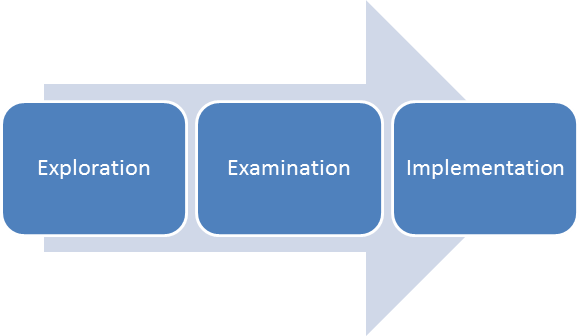Assessing the current state of an organization’s data management efforts can lead to awareness of strengths, areas of improvement and paths to progress
Many organizations have begun to explore the need for an enterprise data management strategy to leverage the value of the data and information they collect, store, use, and propagate. In addition, executives have started to see the increased compliance and regulatory requirements as a call for an improved understanding of the data within the organization.
In the past, many organizations have performed extensive business process re-engineering initiatives to improve their business activities. Any re-engineering effort starts with an assessment of the current state, since the organization cannot improve if it does not know where it stands. Many assessment formats exist for improving processes for both business and information technology (Six Sigma, CMMI, etc.).
Since information is the lifeblood of a 21st century organization, it is critical for the organization to improve information usage, consistency, quality and value. An increased focus on the concept of data as an asset has spurred activities to re-evaluate the need to manage data across the enterprise, as opposed to within a single business department. The lack of existing data management strategies has resulted in incomplete or inaccurate views of business’ need for valuing data as a strategic asset, which can lead to missed opportunities to identify business opportunities, improve processes and reduce costs. A focus on enterprise data management and the development of the components of enterprise data management within an organization can lead to significant improvements in process effectiveness, reduced costs, and increased knowledge.
However, before an organization can embark on the development and implementation of an enterprise data management strategy, it must borrow an activity from business process re-engineering and assess the current state of data management across the organization. As the noted British scientist Lord Kelvin said, “You cannot manage what you have not measured.”
Much has been written about the business and IT process improvement assessment field; there are numerous books, articles, and papers concerning the merits of and the tasks to perform a Six Sigma or CMMI assessment. Unfortunately, data and information have not received this level of attention, so many organizations may be very hesitant to embark on the data management assessment journey, thinking they will be alone and lost. However, data management can use the foundations of the process assessment methodology to develop a data management assessment and improvement model. Doing so allows data management to “stand on the shoulders of giants” and use what has been proven to be effective by amending process assessments to fit the needs of the data management community.
Framework for Data Management Assessment
A basic format for a data management assessment could contain:

Exploration phase:
- Develop list of stakeholders to be interviewed for current state assessment, across all business units, technical areas, all levels of organization
- Determine baseline requirements for each area of data management according to an industry standard framework
- Develop standard interview questionnaire that incorporates requirements for each area of enterprise data management
- Interview all identified stakeholders, using identified requirements as guide for interview questions, document interviews
- Identify any existing data management initiatives, whether at the enterprise or non-enterprise level
- Determine the benefits already achieved across any data management initiatives
- Examine the investment in data management technologies (DBMS, metadata, data modeling, master data, data quality, DW/BI, etc.) by IT and business
- Determine desired results of existing and future data management initiatives through management discussions and calculating returns on investment (ROI)
- Assess the performance of business staff and their processes for data / information management
Examination phase:
- Assess all challenges against identified desired improvements in managing data across the enterprise
- Perform a gap analysis between the current state and requirements / desired state for managing and governing data, including an assessment of the expected level of success
- Analyze the benefits and costs from existing data management suppliers using accepted analysis techniques
- Compare and contrast existing and desired efforts against industry benchmarks and best practices
- Identify required information to develop and implement recommended actions for each chosen area of data management
Implementation phase:
- Identify organizationally based benefits from enterprise data management for each business and IT unit (quantify and qualify)
- Develop high-level enterprise data management strategy and plan (“roadmap”) for the organization
- Prioritize and present cost estimates for the enterprise data management strategy and roadmap
- Write report and presentation on current state assessment and data strategy plan
- Present the plan and steps required to leverage existing and future data management activities and investments – receive approval for implementation
- Develop detailed plan for executing first stage of the enterprise data management roadmap
- Direct activities to achieve improvements on data governance and all areas of enterprise data management chosen for the organization (metadata management, data quality management, enterprise data architecture, etc.)
Challenges in Enterprise Data Management Assessment
Just as with process assessment, evaluating the current state of data management within an organization can present a variety of challenges. Experts from a variety of sources including the CMM Institute have listed the following issues encountered in developing and performing any type of assessment
- Internally-directed and performed assessments are extremely difficult; best results are obtained when external expert resources are used to develop and perform an assessment (industry knowledge, framework knowledge, objectivity, complete focus on assessment, etc.)
- Lack of an industry framework for the domain to be assessed; without a clear understanding of the entire domain, scope discussions will continue to haunt the assessment for the duration. In enterprise data management, most experts will rely on a vendor-neutral enterprise data management framework such as EWSolutions‘ EIM Framework
- Lack of an industry standard maturity model for evaluating current state of each domain component and overall domain maturity, and for projecting target state desired maturity with competencies outlined. In enterprise data management, most experts will rely on the Data Management Maturity Model from CMM Institute or a vendor-neutral enterprise data management maturity model such as EWSolutions‘ EIM Maturity model
- Lack of metrics to measure activity, improvement, progress, etc.. Without metrics and the measurements performed regularly, no assessment is worthy of its name or the time and effort invested in it.
- Lack of sustained attention to continuous improvement in enterprise data management and its components. If the organization has not made a conscious, determined and sustainable commitment to improve all the areas of enterprise data management continually, then performing the assessment will deliver no permanent results.
Conclusion
Although assessment is not an easy or quick task, it is an essential activity for any organization that wishes to begin or improve their data management capabilities. Using the models and methodologies of proven process improvement assessment formats, it is possible for an organization to develop and implement their own solid enterprise data management assessment and improvement initiative.
SEO keywords: enterprise data management assessment, data management assessment, data management assessment process, data management assessment challenges







